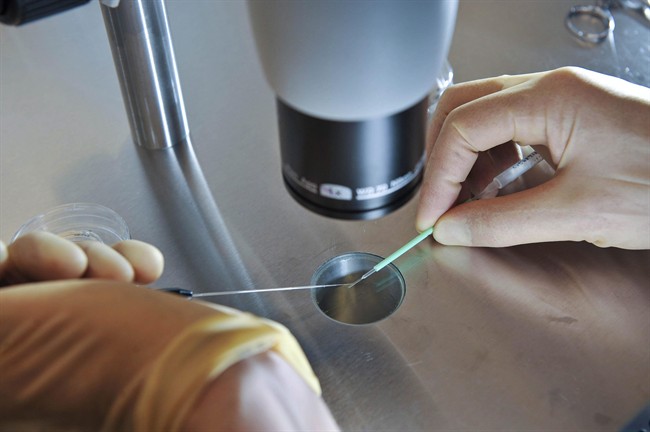A potential breakthrough has been discovered for couples and individuals struggling to have a baby, after researchers at the Centre hospitalier de l’Université de Montréal (CHUM) found a way to improve the success rate of in-vitro fertilization (IVF) treatment.

In Canada, one in six couples are affected by infertility. In order to conceive, some of them opt for IVF — a medical procedure by which an egg is fertilized by sperm in a laboratory before being implemented in a woman’s womb.
READ MORE: Infertility research focusing on women, leaving sperm science behind
“One of the challenges in fertility clinics where women are trying to become pregnant and have a healthy pregnancy is to have the best possible embryo,” said Dr. Greg FitzHarris, the principal researcher and professor at the university.
“One of the problems is the embryos in fertility clinics often have a certain number of cells that have the wrong number of chromosomes. This is a situation called aneuploidy.”
FitzHarris said it’s poorly understood why aneuploidy happens and his team of researchers are trying to understand why it’s so common in the early embryo.
WATCH BELOW: First IVF baby celebrates 40th birthday with exhibit

In their research, the group identified one of the reasons for the high number of defects is linked to the failure of a mechanism called the “spindle checkpoint.” Their laboratory tests show a synthetic substance called proTAME helped reduce the number of defects in mouse embryos and therefore maximized the ones that could be viable.
As a result, the researchers managed to reduce the risk of error by about 50 per cent in mouse embryos by using the drug.
The discovery could eventually help those struggling to conceive and opt for fertility treatment.
“The potential is clear, the concept is clear,” FitzHarris said. “Reducing errors makes good embryos possible.”
However, FitzHarris says the research is still in its early stages.
“This is not something that is not ready for use in the clinic,” he said.
READ MORE: Young, single women turning to sperm donors to conceive
The experiments have only been conducted on mice thus far, he added. FitzHarris insists a great deal of caution should be exercised, since human applications for the research are far from certain.
“There’s an awful lot of safety testing that needs to be done first before this concept is taken anywhere near a real human embryo.”
The study by CHUM researchers was published Thursday in Current Biology.
— With files from The Canadian Press
- Posters promoting ‘Steal From Loblaws Day’ are circulating. How did we get here?
- As Canada’s tax deadline nears, what happens if you don’t file your return?
- Video shows Ontario police sharing Trudeau’s location with protester, investigation launched
- Solar eclipse eye damage: More than 160 cases reported in Ontario, Quebec




Comments